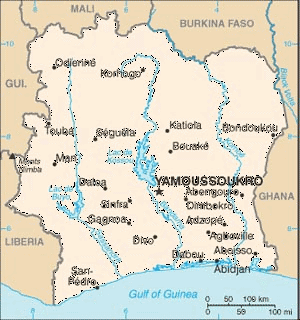Historyguy.com
The
First Ivory Coast Civil War
(2002-2007)

French
Soldiers on duty in Ivory Coast
Ivory
Coast (Cote d Ivorie) Civil War (Sept. 19,
2002-2007)
Rebel soldiers
(who later called themselves the Patriotic Movement of
Ivory Coast (MPCI) launched a coordinated, nation-wide
attack on forces loyal to President Laurent Gbagbo.
Loyalist forces held onto the capital city of Abidjan,
but lost control of the northern cities ofBouake and
Korhogo. Initial reports had former military dictator
General Robert Guei as the leader of the coup.It was also
reported that he perished in the fighting. Ivory Coast
has seen ethnic and religious violence since 2000 between
northern Muslims (such as Guei) and southern Christians
(such as President Gbagbo). The government also claims
that rebel reinforcement entered the country from a
bordering nation, most likely Burkina Faso to the
north.Tensions have increased between the two West
African nations partly as a result of the status of
millions of migrant Burkina Faso citizens living in Ivory
Coast seeking jobs.A cease-fire began on Oct. 17, which
held until the last week of November, as government
forces launched a new offensive with recently acquired
helicopters and what appeared to be a unit of
English-speaking mercenaries.Also, a new rebel group
appeared, seizing several towns along the western border
with Liberia. This group, calling itself the Ivorian
Popular Movement for the Greater West, clashed with
French peacekeeping forces that were attempting to
evacuate Europeans from the area. This Yacouba-based
tribal group, which appears to include some Liberians,
may be connected to one of the factions involved in the
Liberian Civil War. A second western rebel group, called
the Movement for Justice and Peace, appears loyal to the
late General Guei.
From January 15
through January 26, 2003, the warring parties met at
Linas-Marcoussis in France to to negotiate a an end to
the war. The parties signed a compromise deal on January
26. President Gbagbo was to retain power and opponents
were invited into a government of reconciliation and
obtained control over the Ministries for Defense and of
the Interior. Soldiers of the Economic Community of West
African States (ECOWAS) and 4,000 French soldiers took up
positions separating the warring sides. The parties
agreed to work together on modifying national identity,
eligibility for citizenship, and land tenure laws which
many observers see as among the root causes of the
conflict. The civil war was declared over as of July 4,
2003 when the government and New Forces militaries signed
an "End of the War" declaration, recognized President
Gbagbo's authority, and vowed to work for the
implementation of the LMA and a program of
Demobilization, Disarmament and Reintegration
(DDR).
Despite the
written agreement, true reconciliation did not take
place, and in November, 2004, President Gbagbo ordered
airstrikes against the rebel-held north and hit the city
of Bouaké.. These airstrikes also hit (supposedly
by accident, though that is questionalble) French forces
who were in the country to enforce the peace on November
6. In this attack, an Ivorian Sukhoi Su-25 bombed a
French base in Bouaké, killing nine French
soldiers and an American aid worker while injuring 31
others. French forces then responoded with an overland
attack on Yamassoukro Airport, destroying two Su-25s and
three attack helicopters on the ground, while two
government military helicopters were shot down over
Abidjan. One hour after the attack on the camp, the
French Army established control of Abidjan Airport.
France flew in reinforcements and sent three jets to
Gabon on standby.
Pro-government
demonstators , rallied by the pro-government media,
rioted and plundered properties owned by French
nationals. Several hundred Westerners, mainly French
citizens, took refuge on the roofs of their buildings to
escape the mob, and were then evacuated by French Army
helicopters. France sent in f 600 troops as
reinforcements from their base in Gabon and from France
itself while foreign civilians were evacuated from
Abidjan airport on French and Spanish military airplanes.
An unknown number of rioters were killed after French
troops opened fire on the mobs.

Ivory
Coast Map
After the
French-Ivorian clashes in 2004, the two opposing Ivorian
sides settled into a stalemate, whicn proved conducive to
negotiations, and on March 4, 2007, a peace agreement was
signed between the government and the rebel New Forces in
Ouagadougou, Burkina Faso. New Forces leader Guillaume
Soro was then appointed Prime Minister and assumed that
office in early April, 2007. On April 16, in the presence
of Gbagbo and Soro, the U.N. buffer zone between the two
sides began to be dismantled, and government and New
Forces soldiers paraded together for the first time.
Gbagbo declared that the war was over.
Scattered
violence broke out on occassion, including an
assassination attempt on Soro, but the agreement held
until a resumption of the civil war in 2011 after a
disputed election.
Names
of the Conflict:
Ivory
Coast Civil War
Operational
Names of Nations Intervening in Ivory Coast:
Opération
Licorne
(France)
--Operation Unicorn in English
United
Nations Operation in Côte
d'Ivoire
DATES OF
CONFLICT:
BEGAN:
September 19, 2002--rebel soldiers launch attacks on the
government
Foreign
Intervention Began: September, 2002 with the arrival of
French troops. The UN Operation began in
2004
ENDED:
March 4, 2007
**A
Second Ivorian Civil War broke out in March,
2011
Ivory
Coast Civil War Sources and Links:
First
Ivorian Civil War--Wikipedia
Article
Background
Note: Cote d'Ivoire--U.S.
State Department
A
‘Civil War’ that is French and
Neo-Colonial--International
Viewpoint
French
troops in Ivory Coast
battle--BBC
News, Dec. 21, 2002
Copyyright
© 1998-2020 History Guy Media; Last Modified:
03.01.20
"The History Guy" is a
Registered Trademark.
Contact the
webmaster
|

